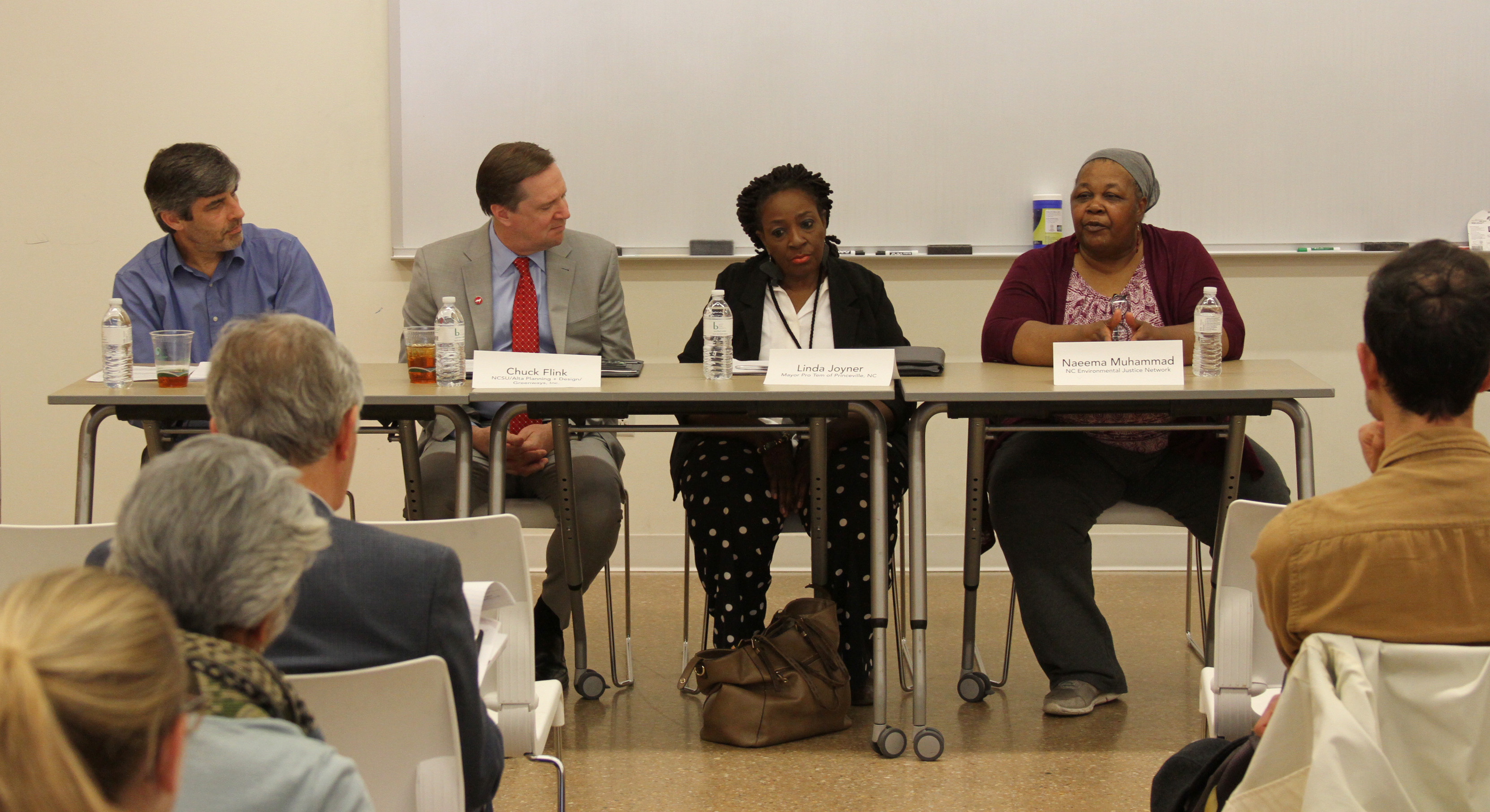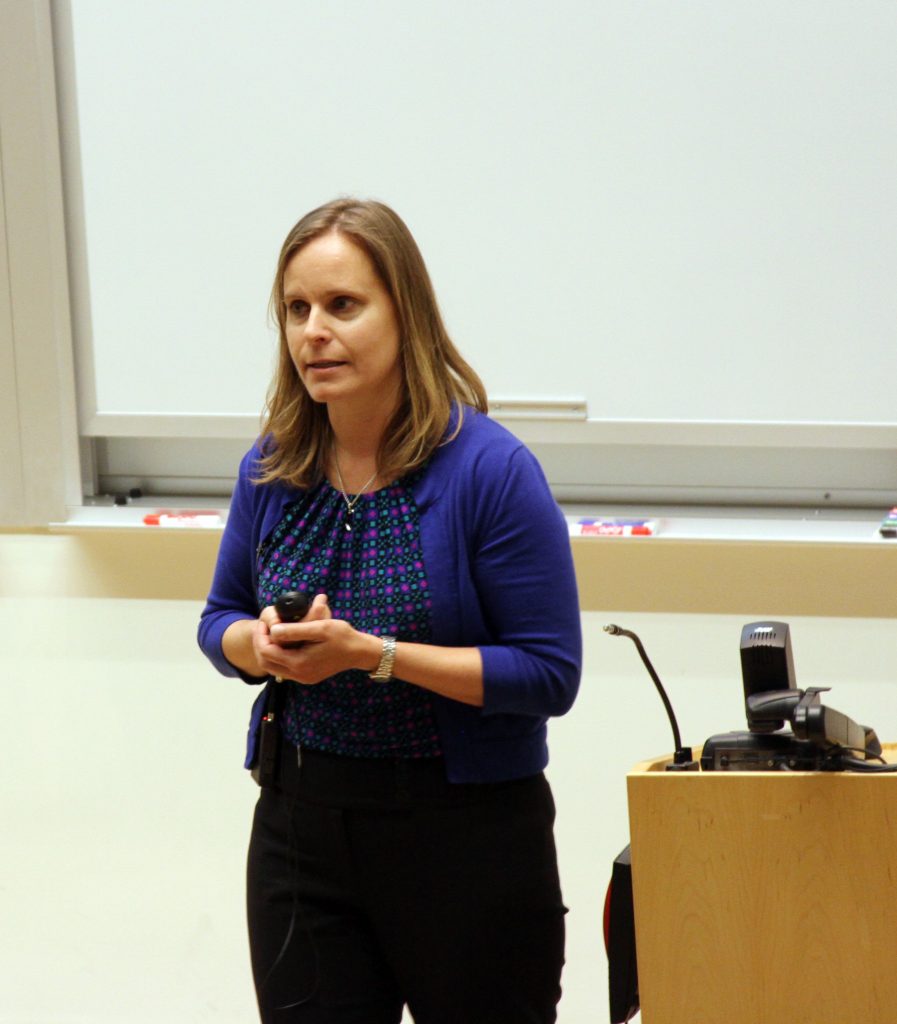
Naeema Muhammad, organizing co-director of North Carolina Environmental Justice Network (third from right) speaks on the “Rural Disaster Recovery and Hurricane Matthew” panel at the Climate Change and Resilience Symposium on April 20, 2018. The panel also included (from left) Dr. Larry Engel, professor in the UNC Department of Epidemiology; Chuck Flink, professor in Landscape Architecture at NC State University; and Linda Joyner, Mayor Pro Tem of Princeville, N.C.
Graduate students at UNC-Chapel Hill who are part of a Natural Hazards Resilience Certificate course taught as part of a Coastal Resilience Center of Excellence (CRC) education project hosted a Climate Change and Resilience Symposium on April 20, 2018. The event included a keynote speaker; two plenary panels focusing on resilience issues; and a student poster contest highlighting local climate-related research.
The student group leading the event, Carolina Hazards and Resilience Planners (CHRP), was formed by students of CRC Director Dr. Gavin Smith who are part of the CRC education project. The event was co-organized by students Christian Kamrath, Margaret Keener and Jessie Straub.
The Symposium was the fusion of the 5th annual Climate Change Symposium (hosted by Carolina Climate Change Scientists) and the 2nd annual Resilience Symposium (hosted by Carolina Hazards & Resilience Planners (CHRP,) also supported by the CRC).
“The event served as a venue for students to present their research, facilitate discussions around climate change and resilience, and connect those across the university involved in Climate Change and Resilience work,” Straub said. “We are excited about the success of this year’s event and look forward to enhancing the event next year and fostering a Climate Change and Resilience Triangle community with collaboration from UNC, Duke and N.C. State.”
The keynote speaker was Dr. Susan White, Executive Director of North Carolina Sea Grant, North Carolina Space Grant and UNC Water Resources Research Institute, who spoke about building resiliency through bridging science and society. Two panels of experts discussed “Climate Change Communication” and “Rural Disaster Recovery and Hurricane Matthew.” The latter panel focused on communities impacted by Hurricane Matthew in 2016 that are the focus of the Hurricane Matthew Recovery & Resilience Initiative.

Susan White of the North Carolina Sea Grant was the keynote speaker at the Climate Change and Resilience Symposium.
Sitting on the “Climate Change Communication” panel were Dr. John Bruno, professor of biology at UNC-Chapel Hill; Dr. Linda Rimer, Liaison for State & Community Resilience for the US EPA (and CRC advisory board member); Dr. David Salvesen, director of the Sustainable Triangle Field Site with the UNC Institute for the Environment; and Dr. Ashley Ward, Climate Integration and Outreach Associate for Carolinas Integrated Sciences and Assessments and UNC Department of Geography.
Participants discussed how to best communicate climate sciences to different audiences through different methods, how to translate results to the public, and the role of scientists and professionals in climate communications.
On the “Rural Disaster Recovery and Hurricane Matthew” panel were Dr. Larry Engel, professor in the UNC Department of Epidemiology; Chuck Flink, professor in Landscape Architecture at NC State University; Linda Joyner, Mayor Pro Tem of Princeville, N.C.; and Naeema Muhammad, organizing co-director of North Carolina Environmental Justice Network.
Participants discussed the challenges faced by small towns and rural areas in recovering from Matthew, the exacerbation of rural areas’ challenges such as population loss from the hurricane, and differing experiences across the state with disaster recovery.
The Symposium was also a chance for undergraduate and graduate students, postdocs and faculty doing research on hazards, resilience and climate change to display and discuss their research through a student poster session. Winners were selected by a panel of judges, with Environmental Sciences & Engineering graduate student Omar Nawaz taking first place for his work on health benefits of decreases in PM2.5 and the ozone in the United States from 1990-2016. Marine Sciences graduate student Molly Bost took second place for her poster on the timescale of storm bed preservation in estuarine middle bay environments from Hurricane Matthew New River, N.C., and Bailey Thomasson won the award for best undergraduate poster for her poster on examining the interactive effects of ocean warming and acidification on the skeletal morphology of two Caribbean reef-building corals.
About the certificate program
The Natural Hazards Resilience Certificate Program, offered by the Coastal Resilience Center (CRC) in partnership with the Department of City and Regional Planning at UNC (DCRP), is a graduate certificate program focused on the study of natural hazards resilience.
The classes include “Planning for Natural Hazards and Climate Change Adaptation” (fall), “Survey of Natural Hazards and Disasters” (spring) and a “Natural Hazards Resilience Speaker Series” (spring).